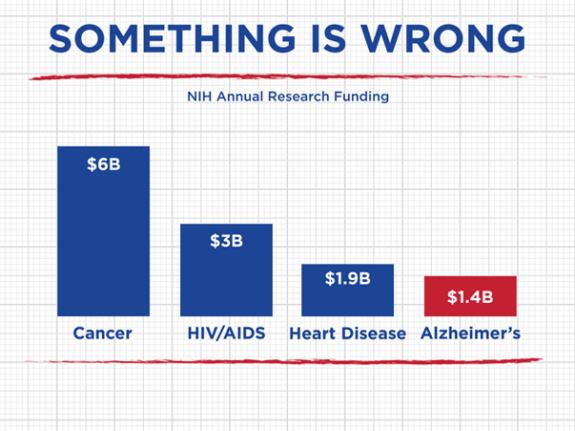 The research community believes it will be possible to prevent or control Alzheimer’s within the next 10 years with adequate research funding and other reforms to accelerate the drug pipeline.
The research community believes it will be possible to prevent or control Alzheimer’s within the next 10 years with adequate research funding and other reforms to accelerate the drug pipeline.
Federal research funding is a fraction of that of other major diseases.
More than $250 billion is spent annually in out-of-pocket healthcare for Alzheimer’s, which is more than 179 times the amount spent on finding a cure.
For every dollar the federal government spends today on the costs of Alzheimer’s care, it invests less than a penny in research to find a cure.
It is important that our government officials make fighting Alzheimer’s a national priority and dedicate adequate resources to research. Go to our action center for concrete ways that you can help.
The first person cured of Alzheimer’s will be in a clinical trial. We must speed up clinical trials and ensure that participants reflect the diversity of those with Alzheimer’s disease.
Important clinical trials that focus on potential prevention and treatment for Alzheimer’s are under way. See our clinical trial page for more information.
Alzheimer’s is a global crisis that requires a global solution. It is a grave threat to the world’s health and finances if not stopped. Worldwide about 50 million people have some form of dementia, and someone in the world develops dementia every three seconds.12
When the world has faced catastrophic challenges before, nations have marshaled significant resources behind clear goals and objectives to achieve great things. For example, the world committed to ambitious, aggressive, and well-funded efforts to prevent and treat HIV/AIDS, tuberculosis, and malaria. Those efforts have paid significant dividends in lives saved and economic development fostered.
UsAgainstAlzheimer’s Chairman and Co-Founder George Vradenburg serves on the World Dementia Council to tackle this problem globally; find out more about their work here.
1 Tara Bahrampour New study ranks Alzheimer’s as third leading cause of death, after heart disease and cancer. The Washington Post March 2014.
2 National Institute on Aging Number of Alzheimer’s deaths found to be underreported.
3 B. D. James, et al. Contribution of Alzheimer’s disease to mortality in the United States. Neurology, March 2014, 82(12): 1045-50.
4 Alzheimer’s Association. 2017 Alzheimer’s Disease Facts and Figures.
5 Ibid.
6 Ibid.
7 Ibid.
8 Nick Eberstadt. Hiding in Plain Sight: Social and Demographic Trends That Will Exacerbate the Impact of Alzheimer’s.
9 Home-Instead-Marist Poll, November 2012.
10 Alzheimer’s Association. 2017 Alzheimer’s Disease Facts and Figures.
11Alzheimer’s Association. Costs of Alzheimer’s to Medicare and Medicaid Fact Sheet. March 2017.
12Alzheimer’s Disease International, Disease Statistics.

